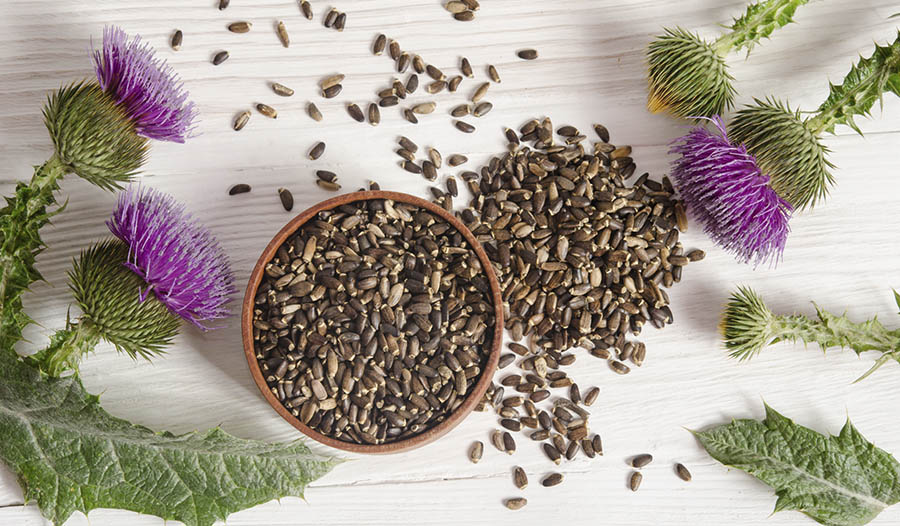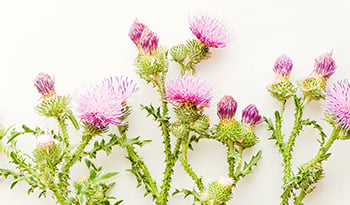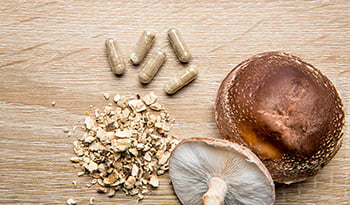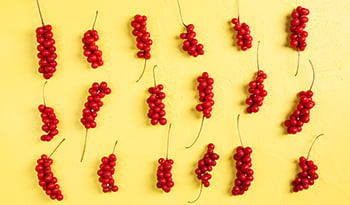Milk Thistle Extract: Benefits, Detoxification, Liver Health, and More
DISCLAIMER:This blog does not intend to provide diagnosis...
- In this article:
- What Is Milk Thistle Good For?
- How Milk Thistle Extract Aids Detoxification
- What Does the Research Say About Milk Thistle Extract?
- Enhancing the Power of Milk Thistle Extract
- Better Absorption and Better Results
- Milk Thistle and Side Effects
- Takeaway

Originally Posted September 2017 | Updated January 2023
The human liver is an incredibly complex and hardworking organ. It performs many vital functions, but the two that receive the most attention are its roles in detoxification processes and the metabolism of carbohydrates, fats, and protein. To function correctly, it is important to protect the liver from the constant bombardment of toxic chemicals produced internally and from food, water, and the environment.
What Is Milk Thistle Good For?
Many plants exert beneficial effects on liver function. However, the most impressive research has been done on milk thistle extracts (Silybum marianum). Much of the health benefits of milk thistle extracts are due to the concentration of silymarin, a complex of flavonoid compounds that significantly protect the liver from damage and enhance detoxification processes. Silymarin components are among the most potent liver-protecting substances known.
Milk thistle extract can protect the liver from damage and regenerate new, healthy liver cells to replace the old damaged ones. And it's not just the liver that milk thistle helps. Research has also found that milk thistle extract can help repair and regenerate kidney cells, increasing kidney cell replication by 25%-30%. The kidneys are another essential aspect of detoxification.
Milk thistle extracts (usually standardized to contain 70% silymarin) have shown various beneficial effects in human clinical trials, many of which are related to improving liver function. When liver function improves, it allows this organ to do its job. As a result, improvements are noted in blood sugar control, cholesterol and fat metabolism, and general health.
How Milk Thistle Extract Aids Detoxification
One of the key manners in which milk thistle extract enhances detoxification reactions is by preventing the depletion of glutathione. The level of this valuable detoxification aid, antioxidant, and cellular protector within the liver is critically linked to its ability to protect itself and detoxify harmful compounds. Essentially, the higher the glutathione content, the greater the liver's capacity to detoxify harmful chemicals.
Typically, when exposed to chemicals that can damage the liver, including alcohol, the glutathione concentration in the liver is substantially reduced. This reduction in glutathione makes the liver cell susceptible to damage.
Milk thistle extract not only prevents the depletion of glutathione induced by alcohol and other toxic chemicals but also has been shown to increase the level of glutathione in the liver by up to 35% in people with normal liver function. Since the ability of the liver to detoxify is related to the level of glutathione in the liver, the results of this study indicate that milk thistle extract can increase detoxification reactions by up to 35%, even in healthy individuals.
What Does the Research Say About Milk Thistle Extract?
In numerous clinical studies, silymarin has been shown to have positive effects in supporting liver health regardless of the stress or challenge to this organ. The benefits are typically confirmed by clinical and laboratory data. For example, one early study highlighted the benefit of silymarin in individuals exposed to toxic chemicals. In this study, abnormal results of liver function tests (elevated levels of liver enzymes in the blood [AST and ALT activity]) and/or abnormal platelet or white blood cell counts were observed in 49 of 200 workers exposed to toxic toluene and/or xylene vapors for 5 to 20 years. Thirty affected workers were treated with silymarin, and the remaining 19 were left without treatment. Taking milk thistle extract improved liver function parameters and platelet and white blood cell counts.
Milk thistle extract is also helpful in the fatty liver associated with obesity, diabetes, and metabolic syndrome (abdominal obesity, elevated blood lipids, insulin resistance, etc.). In studies of subjects with these disorders, milk thistle extract led to significant improvements in liver function and, as a result, blood sugar and cholesterol metabolism. Milk thistle extract also improved some antioxidant indices (SOD, GPX, and TAC) and decreased a marker of inflammation (C-reactive protein). Athletes have also been shown to respond to milk thistle extract's ability to boost antioxidant markers in the blood.
Enhancing the Power of Milk Thistle Extract
The best form of milk thistle utilizes Phytosome® technology to bind silybin, the key active component of silymarin, to phosphatidylcholine produced from sunflower oil.
Phosphatidylcholine, the key component of lecithin, is not merely an emulsifier or carrier of the silybin. It has also been shown to promote liver health by helping to repair cell membranes. Hence, these two components of Siliphos® work synergistically to protect and repair liver cells. Scientific research indicates that Siliphos® is better able to accomplish this goal than regular milk thistle extracts because it is better absorbed and has the added benefit of phosphatidylcholine.
The absorption advantage of Siliphos® has been shown in several human and animal studies when it has been compared to an equal amount of silybin in regular milk thistle extracts. In one study, the excretion of silybin in the bile was evaluated in patients undergoing gallbladder removal because of gallstones. A special drainage tube, the T-tube, was used to get the necessary bile samples. Patients were given either a single oral dose of Siliphos® or silymarin from milk thistle extract. The amount of silybin recovered in the bile within 48 hours was 11% for the Siliphos® group and 3% for the silymarin group.
One of this study's significant features is that silybin has been shown to improve the solubility of bile. Since more silybin is being delivered to the liver and gallbladder when the phosphatidylcholine-bound silybin is used, this form is the ideal form to support liver health in individuals with poor bile solubility seen in such conditions as gallstones or fatty infiltration of the liver, two conditions characterized by decreased bile solubility.
Another study designed to assess the absorption of Siliphos® plasma silybin levels was determined after the administration of single oral doses of Siliphos® and a similar amount of silybin from milk thistle extract to 9 healthy volunteers. The authors concluded Siliphos® was absorbed roughly seven times greater than regular milk thistle extracts standardized to contain silymarin (70-80%).
Better Absorption and Better Results
Several human clinical studies have also shown Siliphos® to produce better results than regular silymarin extracts in supporting improved liver function. For example, in a study designed primarily to evaluate the dose-response relationship of Siliphos®, positive effects were again displayed at a level better than those reported for milk thistle extracts containing 70-80% silymarin.
In the study, patients with chronic poor liver function were given different doses of Siliphos®: 20 patients received 80 mg twice daily, 20 pts received 120 mg twice daily, and 20 patients received 120 mg three times daily for two weeks. At all tested doses, Siliphos® produced a remarkable and statistically significant decrease in laboratory measurements indicating liver function, such as the levels of bilirubin and liver enzymes (e.g., ALT, GGTP, etc.). These results indicate that even short-term use of Siliphos® can improve liver health.
Milk Thistle and Side Effects
Milk thistle extracts have been extensively studied and show no toxic effects in animal or human studies. Because silymarin increases bile flow, humans may produce a looser stool.
Takeaway
In conclusion, plants have many ways of helping us with our health. From reducing inflammation to improving liver function, many species lend a hand in keeping us feeling our best. Milk thistle extracts are particularly notable due to their high concentration of silymarin, and research has shown multiple beneficial effects when taken by humans. Of course, always consult your physician before beginning any new health regimens and ask your doctor to assess if milk thistle extract might be an appropriate choice for you. If they agree that taking it can improve your well-being, then nothing should stand in the way of you harnessing the incredible power of nature!
References:
- Marmouzi I, Bouyahya A, Ezzat SM, El Jemli M, Kharbach M. The food plant Silybum marianum (L.) Gaertn.: Phytochemistry, Ethnopharmacology and clinical evidence. J Ethnopharmacol. 2021 Jan 30;265:113303.
- Wang X, Zhang Z, Wu SC. Health Benefits of Silybum marianum: Phytochemistry, Pharmacology, and Applications. J Agric Food Chem. 2020 Oct 21;68(42):11644-11664.
- Fanoudi S, Alavi MS, Karimi G, Hosseinzadeh H. Milk thistle (Silybum Marianum) as an antidote or a protective agent against natural or chemical toxicities: a review. Drug Chem Toxicol. 2020 May;43(3):240-254.
- Tighe SP, Akhtar D, Iqbal U, Ahmed A. Chronic Liver Disease and Silymarin: A Biochemical and Clinical Review. J Clin Transl Hepatol. 2020 Dec 28;8(4):454-458.
- Bahmani M1, Shirzad H, Rafieian S, Rafieian-Kopaei M. Silybum marianum: Beyond Hepatoprotection. J Evid Based Complementary Altern Med. 2015 Oct;20(4):292-301.
- Szilard S.; Szentgyorgyi D.; Demeter I.. Protective effect of Legalon in workers exposed to organic solvents. Acta Med Hung (1988) 45 249–256.
- MacDonald-Ramos K, Michan L, Marttinnez-Ibarra A, Cerbon M. Silymarin is an ally against insulin resistance: A review. Ann Hepatol. 2021 Jul-Aug;23:100255.
- Ebrahimpour Koujan S, Gargari BP, Mobasseri M, Valizadeh H, Asghari-Jafarabadi M. Effects of Silybum marianum (L.) Gaertn. (silymarin) extract supplementation on antioxidant status and hs-CRP in patients with type 2 diabetes mellitus: a randomized, triple-blind, placebo-controlled clinical trial. Phytomedicine. 2015 Feb 15;22(2):290-6. Doi: 10.1016/j.phymed.2014.12.010.
- Boukazoula F, Ayari D. Effect of milk thistle (Silybum marianum) supplementation on the serum levels of oxidative stress markers in male half marathon athletes. Biomarkers. 2022 Jul;27(5):461-469.
- Bijak M. Silybin, a Major Bioactive Component of Milk Thistle (Silybum marianum L. Gaernt.)-Chemistry, Bioavailability, and Metabolism. Molecules. 2017 Nov 10;22(11).
- Kidd P, Head K. A review of the bioavailability and clinical efficacy of milk thistle phytosome: a silybin-phosphatidylcholine complex (Siliphos). Altern Med Rev. 2005 Sep;10(3):193-203.
- Schandalik R, Perucca E. Pharmacokinetics of silybin following oral administration of silipide in patients with extrahepatic biliary obstruction. Drugs Exp Clin Res 1994;20:37-42.
- Barzaghi N, Crema F, Gatti G, et al. Pharmacokinetic studies on IdB 1016, a silybin-phosphatidylcholine complex, in healthy human subjects. Eur J Drug Metab Pharmacokinet 1990;15:333-338.
- Marcelli R, Bizzoni P, Conte D, et al. Randomized controlled study of the efficacy and tolerability of a short course of IdB 1016 in the treatment of chronic persistent hepatitis. Eur Bull Drug Res 1992;1:131- 135.
- Wu JW, Lin LC, Tsai TH. Drug-drug interactions of silymarin on the perspective of pharmacokinetics. J Ethnopharmacol. 2009 Jan 21;121(2):185-93.

 By Dr. Michael Murray, N.D.
By Dr. Michael Murray, N.D. 


